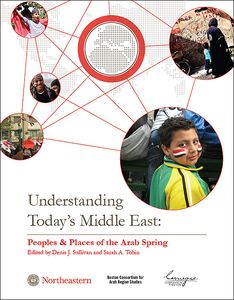Pardee Student Publishes Paper on Muslim Brotherhood
 What caused the downfall of the Muslim Brotherhood? The answer may be a confluence of infighting and a deep Egyptian hunger for democracy.
What caused the downfall of the Muslim Brotherhood? The answer may be a confluence of infighting and a deep Egyptian hunger for democracy.
Louise Klann, a masters candidate in International Relations and Religion at the Frederick S. Pardee School of Global Studies at Boston University, said that inflexibility within the Muslim Brotherhood contributed to the downfall of the government headed by Mohammed Morsi in the aftermath of the Arab Spring uprising in Egypt in 2011.
“I argue that the Brotherhood’s internal rivalries curtailed the political flexibility and creativity needed to address Egypt’s dysfunctional state,” said Klann in her research. ” If reformists had gained organizational control, there may have been a very different outcome.”
Klann’s insights were published by the Boston Consortium for Arab Region Studies at Northeastern University. Their most recent publication, “Understanding Today’s Middle East: People and Places of the Arab Spring,” can be seen here.
 “Even if Morsi had intended to remain fully committed to the democratic experiment, and “learned” these skills while in office, they would have had to learn them all at once, under the immense pressures of managing the deep state and building a democracy for the first time—a Herculean task,” said Klann in her paper. “The Muslim Brotherhood’s glaring failure during its year in Egypt’s executive office has been attributed to political naïveté and Mubarak-era elites’ concerted effort to thwart the Brotherhood’s policies. These explanations are undoubtedly true, but they don’t capture the complete picture.”
“Even if Morsi had intended to remain fully committed to the democratic experiment, and “learned” these skills while in office, they would have had to learn them all at once, under the immense pressures of managing the deep state and building a democracy for the first time—a Herculean task,” said Klann in her paper. “The Muslim Brotherhood’s glaring failure during its year in Egypt’s executive office has been attributed to political naïveté and Mubarak-era elites’ concerted effort to thwart the Brotherhood’s policies. These explanations are undoubtedly true, but they don’t capture the complete picture.”
Louise Klann is an M.A. candidate at Boston University in International Relations & Religion, specializing in transnational Islamic politics in Egypt and the Levant. Her research examines the changing shape of politics after the Arab Uprisings–as people, ideas and proxy militant groups more easily cross borders. She was the editor of a January 2014 conference report on “The Syrian Refugee Crisis & the Contiguous States,” a report from the November 2013 international conference on “The Arab Uprisings: Accomplishments, Failures and Prospects,” and a May 2014 report on “Sexual and Gender Based Violence against Syrian Refugees.” She completed her B.A. in International Relations at Tufts University.